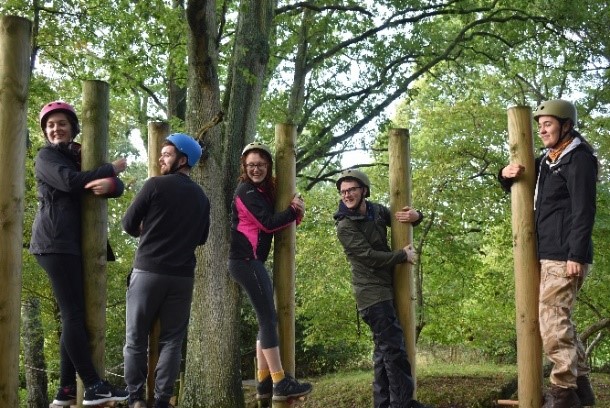In October 2019, having recently joined the CSCT, Cohort ‘19 went on a 2-day team-building trip to Magdalen Farm, a working farm that showcases the benefits and challenges of sustainable agriculture. In this piece, Philip Yang talks us through their stay and how the farm addresses its own sustainability challenges.
As soon as we got to Magdalen Farm we were busy working together in orienteering and rope challenges, while also meeting all the animals. Although we were preoccupied with solving every test and puzzle thrown our way, we soon realised that Magdalen works as the perfect exhibit for a discussion on the importance and development of sustainable farming.

Situated in Somerset on a 132-acre site, the farm makes use of modern technologies and renewable resources in many areas, such as power, waste management and building materials.
Agriculture has been a part of our livelihoods for thousands of years (the earliest evidence of trial plant cultivation dates back some 23,000 years!). Considering it has been around for so long, the topic of sustainable farming may appear ironic. But in the modern era, a sharp rise in produce demand means that farmers must balance the economic and environmental needs of their sites — they must be able to produce enough to meet demand and be profitable, but not too much that they would damage the land (and effectively end their business). The challenge of balancing these two crucial variables is highlighted in many aspects of the day-to-day running at Magdalen.
For a start, solar panels add extra power to the site by transforming sunlight into energy (although the British weather may have something to say about that!).
Some buildings on the site, such as the one known as 'The Roundhouse' (picture below), are made from completely renewable building materials. Reused tyres make the sturdy foundation of the roundhouse, while the walls leading up to the thatched roof are made from straw and lime, which are surprisingly tough construction materials.

Magdalen Farm also manages and composts their sewage waste on site, using a horizontal, gravity-based system that ejects liquid waste to separate it from the rest. This gives an added use to the waste as it can be used as fertiliser, and it means the farm isn’t contributing to the sewage disposal needs of the local area.
Water is acquired from a local spring and filtered on the farm too, so it is safe to use. This water is used for everything: from showers and drinking to taking care of the animals. According to our guide, if appropriate pipes were installed, excess water could even be sold to the water company to make the process more viable in a financial sense.
As you can see, Magdalen Farm has many sustainable tricks up its sleeves. Still, some processes are harder to maintain through sustainable means than others, and things can get complicated when trying to implement alternative technologies. For example, a wood pellet boiler provides heating for the site in many areas like the heated tunnels, which help to maintain optimum conditions to grow certain crops. The wood pellets can come from waste wood sources, such as the carpentry industry and since low government tariffs on this fuel were low when the boiler was installed, this was a viable option at the time.

However, wood pellets can potentially be a source of contamination for crops, so now they can only come straight from felled trees, which the site has to import from Scandinavia. Although this increases the carbon footprint and cost of the overall operation, the boiler is still drawing on a renewable resource, unlike conventional options. This example shows that, in sustainability, sometimes you can have this double-edged sword effect.
It’s not all doom and gloom though; exciting alternative and future technologies mean that there is always room for improvement. For instance, wood chip boilers are less restricted in terms of sourcing fuel compared to the pellet variant, and they could be a viable option provided it was worth the large initial investment, which is something that the staff at Magdalen are currently studying. Solar panel efficiency has also improved in recent years, with manufacturers selling solar panels that are 5-10% more efficient than those first installed on the farm almost 20 years ago.
We really enjoyed learning about sustainability practices on the farm. But it wasn’t all about sustainability — turns out you can also get to know one another really well by feeding animals and hugging wooden poles!
Respond



